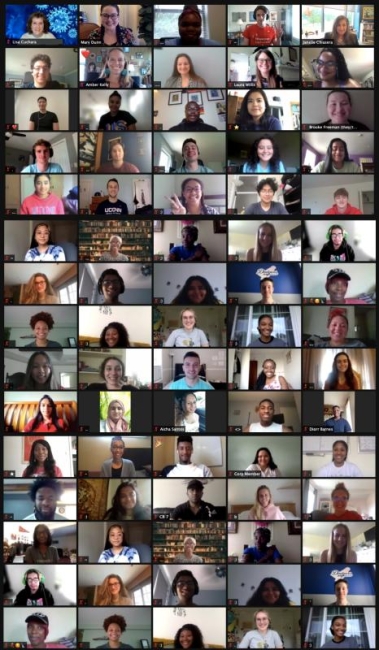You have /5 articles left.
Sign up for a free account or log in.

Members of the Connecticut Public Health College Corps during virtual training.
Courtesy of Quinnipiac University
Quinnipiac University is training students to work with local health departments to address vaccine hesitancy in communities across Connecticut.
The Connecticut Public Health College Corps program is training about 110 students from across the state in topics including vaccine knowledge and communication strategies, motivations and persuasion in storytelling, and active listening before embedding them in four-week placements with local public health departments in nine cities.
Students are completing a week of virtual training taught by a cross-disciplinary group of Quinnipiac faculty with expertise in biomedical sciences, communication and social work before beginning their work in the communities next week. Students will receive a $2,750 stipend for their participation in the program, which is being funded by the Connecticut Department of Public Health.
“We plan on them spending 35 hours a week out in the community helping expand capacity in the communities with the work that they’re already doing to address vaccine hesitancy,” said Janelle M. Chiasera, dean of Quinnipiac’s School of Health Sciences.
She said students will help with tasks such as canvassing and outreach, event planning, and social media campaigning.
“I will tell you Connecticut over all, we’re doing really good job compared to the rest of the country,” Chiasera said. “The percent fully vaccinated in the U.S. is 49 percent, and we have about 62 percent in the state of Connecticut. But when you start looking at race and ethnicity percentages and age percentages, it tells a little bit of a different story.”
About 58 percent of white people in in Connecticut are fully vaccinated, compared to about 43 percent of Hispanic people, 37 percent of Black people and 29 percent of people of multiple races, according to state data.
As is consistent with national trends, younger people in Connecticut are less likely than older adults to be vaccinated: about 53 percent of people age 16 to 24 are fully vaccinated, compared to more than 80 percent for those age 55 and up.
“There are some pockets where we still need help,” Chiasera said. “I think that’s the spirit of the corps, is to try to get students out there to help in those particular areas.”
Although it is being organized by Quinnipiac, the students participating in the program come from a variety of different four-year and two-year colleges across Connecticut.
Tony Hsieh, a student at Tunxis Community College studying communication, said his goal for participating is to “at least plant a seed” for others to consider the vaccine -- or at least to help “people who simply don’t have time and don’t have the resources to get correct information.
“A lot of people feel unheard. Our mission is not just to spread correct information but also to listen to them. What are your concerns? We want to know.”
Brian Omondi, another program participant who is studying economics and data science at Quinnipiac, said he is fascinated by behavioral economics and questions of what people value.
“With a lot of the misinformation that has come out, it’s left people without direction or to be able to discern what the best way forward is,” Omondi said. “Being able to provide a little bit of clarity for people to make the best decisions for themselves and their families and their communities as a whole is something that I’m very happy to be a part of.”
Scott C. Ratzan, distinguished lecturer at the City University of New York Graduate School of Public Health and Health Policy and co-founder of CONVINCE USA, a project to increase vaccine literacy, said there could be particular value in a model that deploys college students to talk about the vaccine with other people around their age and in their networks.
More broadly, he said, “It’s excellent fundamentally to teach students about public health. More than ever, we need more people in public health at multiple levels.”
The Connecticut Public Health College Corps program is modeled on another new state-funded service program, the College Corps Connecticut Summer Program at Fairfield University, which has an education rather than a public health focus.
Laurie Grupp, dean of the School of Education and Human Development at Fairfield, said about 370 undergraduates are working in about 160 different sites to support summer enrichment programs offered by different community groups such as YMCAs and Boys and Girls clubs. Participants receive up to a $4,500 stipend for an eight-week commitment, including a one-week training taught by Fairfield faculty.
Grupp said the idea for the corps was born out of a task force that connected K-12 and higher education leaders to discuss the impacts of the pandemic.
“We started talking early on about summer enrichment and what it would look like for kids who had been out of school for nearly a year and a half to go back to school in August or September if they are able to be in person and what would it take for them to succeed,” she said. “We realized what they needed was social, emotional and physical development activities to try to get them emotionally, physically, socially ready for being in school in person starting soon.”








